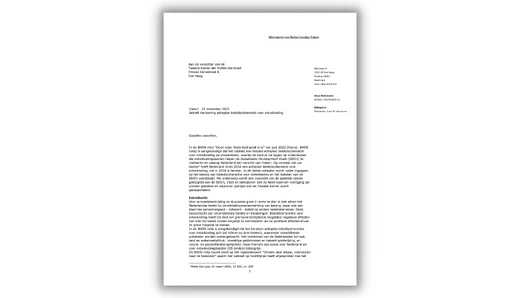For years, the Netherlands has been investing in developing countries through development cooperation, but this involves mopping the water up. In fact, the Netherlands regularly makes policy choices that exacerbate or even cause situations and problems in these countries. For instance, the Dutch tax policy multinationals are able to reduce, or even completely avoid paying taxes in developing countries. As a result, developing countries miss out on more money than they receive through development cooperation, and so there is policy incoherence. In terms of climate policy, the Netherlands also makes incoherent choices: e.g. subsidises Netherlands still investing in fossil industry, while investments in green energy lag behind.
Last Friday, Minister Schreinemacher (Foreign Trade and Development Cooperation) launched her revised Policy coherence for development action plan. The first action plan was already launched in 2016. The plan sets targets and indicators, which will be reported on annually. It is incredibly good that this action plan is in place, as it is an important tool for the Chamber to monitor the steps taken by the government on policy coherence for development.
Proper application SDG test needed
That steps need to be taken is obvious. The Netherlands ranks 160, out of 163 countries, on the SDG spillover index. This means that there are only 3 countries that do worse than the Netherlands and that the Netherlands therefore has a very negative impact on the ability of other countries to achieve the SDGs. Minister Schreinemacher explicitly acknowledges this poor position of the Netherlands in the action plan. This is a good first step, but now action is needed to change this.
An important tool the Netherlands already has is the SDG key. This means that Dutch policies and legislation should be tested for their impact on the SDGs and on developing countries in particular. However, this test is relatively unknown among officials who have to apply it and is therefore insufficient applied. Schreinemacher now announces that six-monthly mapping with relevant ministries will identify relevant proposed policies on the agenda and the knowledge and resources they need to test for policy coherence at an early stage. Hopefully, this will indeed lead to the SDG test being properly applied and coherence being taken into account early.
It is curious to note that the minister chose not to apply the SDG test specifically to policies of the Ministry of Infrastructure and Water Management. In fact, I&W regularly makes policies that have an impact on developing countries. The main example is the National Circular Economy Programme (NPCE), which is expected in the near future. It is therefore very important that the SDG test is also properly applied to I&W policy.
Especially in programmes like the NPCE, it is important that policy coherence for development is given a prominent place. The indicators Indeed, in the policy coherence action plan refer to the NPCE. At the same time, it is still completely unclear whether the measures in the NPCE actually contribute to sustainable development elsewhere, or at least do not hinder it.
Reporting on impact
We have also been calling for years, from FMS and Building Change, to improve the action plan by reporting more on impact. For this, it is important that the Netherlands provides insight into the interests at stake in the policy choices made, and the synergies and trade-offs. In this way, everyone can gain clear insight into where policies are inconsistent and where steps can still be taken. In the action plan, Schreinemacher promised to make this insightful. However, it remains to be seen how this will be put into practice. The way in which the action plan is currently set up carries the risk that only sic on the indicators will be reported. That would make the action plan a hollow phrase. The first annual report on policy coherence for development will be published in mid-May. It will then become clear whether the minister is indeed going to work on this.
So there are certainly hopeful signs in the renewed Policy Coherence for Development action plan, but also definitely some areas for improvement. From FMS, together with Building Change, we will continue to work on this.
From Building Change, we have also published an initial substantive response to the action plan. Which you can this page read.





